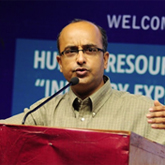How do you define ethics in PR?
PR Insight
Paarul Chand
In the wake of the horrifically tragic Kathua incident, a PR professional posted the following message at a popular Facebook group for PR and journalists:

It is posts like these that end up promoting a negative image of the PR profession. The gross insensitivity of the post triggered of a sharp debate on PR led WhatsApp groups against the post and about ethics in PR.
 According to Anand Mahesh Talari, managing director, Mavcomm Consulting ethics is a complex issue and in PR dictated by the stakeholder.
According to Anand Mahesh Talari, managing director, Mavcomm Consulting ethics is a complex issue and in PR dictated by the stakeholder.
He adds, “With clients - It will be about setting the right expectations and being transparent about what PR can deliver and can't deliver. Too many firms fall into the lure of taking the money first and then telling the client it's not possible. With media, it’s about transparency of information, data and even if a spin is used to ensure that the journalist is getting the exact meaning of what is being said. It's also about having moral guidelines of not using incidents like deaths, rapes or natural calamities to earn PR mileage which was recently the case.”
Smruti Alinje Bhalerao, founder, Prittle Prattle, also places ethics with client as a key aspect of ethics in PR, “I personally think the presentation to a client of the benefits and deliverables is so exaggerated and unrealistic that the client thinks that now he would be featured on the covers of magazines and on the front page of newspapers. Later, when the deliverables appear the client is unsatisfied because the PR firm failed to deliver the dream they showed him. We should first stop doing that and show the client a real picture, instead of giving false hope.”
What causes unethical PR behaviour?
PR professionals agree that choosing the wrong, short -term process for delivering PR results and over-promising those results is the heart of the problem with the image of PR.
Swapan Dholakia, head, communications & outreach, Shark ID says that, “The core problem is with how people want a certain perception built - even if the facts are different. Change will need to be driven by both, the clients and PR professionals. Senior PR professionals will need to counsel clients on how to ensure better practices and also adhere to these norms themselves. I believe it is about reverting to basic approaches - deliver & do things that can stand up to scrutiny.”
This would go a long way to mitigate the effect of the way PR is referred to and perceived. PR professionals also feel there should be a consistent effort to talk about what PR is all about.
Mahesh Talari says, “I see the word being loosely used by media, politicians and celebrities. In this background, there is definitely a requirement to inform people at  large about what is PR and it's relevance for reputation management and marketing. “
large about what is PR and it's relevance for reputation management and marketing. “
Dholakia recommends doing this by, “Standing up for and stating the way things are and should be: this is ethical behaviour in PR. Not stretching the facts (when no one is going to check) and staying true to the unwritten norms of the trade - these are ethics. Not dazzling a client with jargon and being true to them defines ethical behaviour in PR.”
“I was running the PR for an international history conference. The local language media requested me for interviews with the global scholars attending. Good coverage in return for gifts was implied. I firmly refused and focused on the mainlines. Later, my client really appreciated this approach.” Swapan Dholakia.
Inculcating ethical PR behaviour
 According to communications professional, Shalaka Parab, at Thought Pencil Communications , one of the best ways to ensure ethics in PR is by, “Insisting on a level of domain knowledge and competence in PROs that can neutralise any temptation or need to game the system through compromises.”
According to communications professional, Shalaka Parab, at Thought Pencil Communications , one of the best ways to ensure ethics in PR is by, “Insisting on a level of domain knowledge and competence in PROs that can neutralise any temptation or need to game the system through compromises.”
“Stop positioning PROs as brokers between journalists and clients. Leave matchmaking to algorithms. Focus on being the harbinger of fresh ideas and new facts, redefine PR as an essential business service for the information age.”
Helsinki Code of Ethics
In October, last year, ICCO adopted the Helsinki declaration that codified 10 principles of ethical behaviour and called on the global PR business to do the same.
Reactions to this are mixed in India. Dholakia says bluntly that, “Having a code of ethics is admirable but getting folks to adhere to it is another thing entirely. Enforcing it is a mammoth and impossible task.”
Mahesh Talari is more optimistic opining that, “It's a great starting point as broadly it captures the most relevant points. Indian firms should try to make these a part of their on-boarding process. Enforcement is difficult because there is no clear industry body or regulatory authority.”
Parijat Chakraborty, executive director, Ipsos public affairs & Ipsos loyalty sums up the debate stating, “Ethics are the foundation of sustainable growth, in all spheres of life. It is true for all businesses, more so for professional service sectors with intangible offers. Good companies have processes and policies, like whistle blower, that tend to arrest any slippage on ethical practices. Great companies, however, have it in their corporate DNA, a reason for their long-term success.”
If you enjoyed this article, you can subscribe for free to our weekly event and subscriber alerts.
Featured

PR professionals share their views on journalists publicly calling them out on story pitches

Auto blogger renders unconditional apology to Value 360 for defamatory posts

Hottest Indian startups of 2020, Paytm, Dreams 11 lead the charge: Wizikey Report




